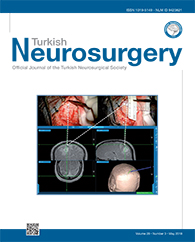2Catholic University of Korea, College of Medicine, Seoul St. Mary?s Hospital, Department of Neurosurgery, Seoul, Korea DOI : 10.5137/1019-5149.JTN.20103-17.1 AIM: Oblique lateral interbody fusion (OLIF) is a minimally invasive surgical method that can provide an access to the lumbar spine without direct dissection of psoas muscle and the need for intraoperative neuromonitoring (IOM) is questionable. The aim of this study was to examine and document the transient and persistent perioperative complications in patients who underwent OLIF for degenerative lumbar disease without IOM.
MATERIAL and METHODS: A total of 129 consecutive patients who were diagnosed as degenerative spinal disease from L1 to S1 and underwent mini-open OLIF were identified and retrospectively reviewed. All patients were classified as two groups; non-IOM group and IOM group. According to the relation to surgical procedure, the complications were divided into two groups; "procedurerelated" and "procedure-unrelated". Based on the effect of duration, the complications were defined as "transient" where the symptom is relieved within 30 days postoperatively, and "persistent" where the symptom remains for more than 30 days postoperatively.
RESULTS: The study groups comprised 57 cases in the IOM group and 72 in the non-IOM group. The complication rate was 24.6% (transient; 17.6%, persistent; 7.0%) in the IOM group and 29.2% (transient; 25.0%, persistent; 4.2%) in the non-IOM group. The incidence of postoperative leg symptoms related to lumbar plexus and/or psoas muscle injury was 6 transient and 3 persistent in the IOM group (overall 15.3%), and 12 transient and 3 persistent in the non-IOM group (overall 20.9%).
CONCLUSION: Mini-open OLIF can be safely carried out without the aid of IOM.
Keywords : Intraoperative neuromonitoring, Minimally invasive surgery, Oblique lateral interbody fusion




